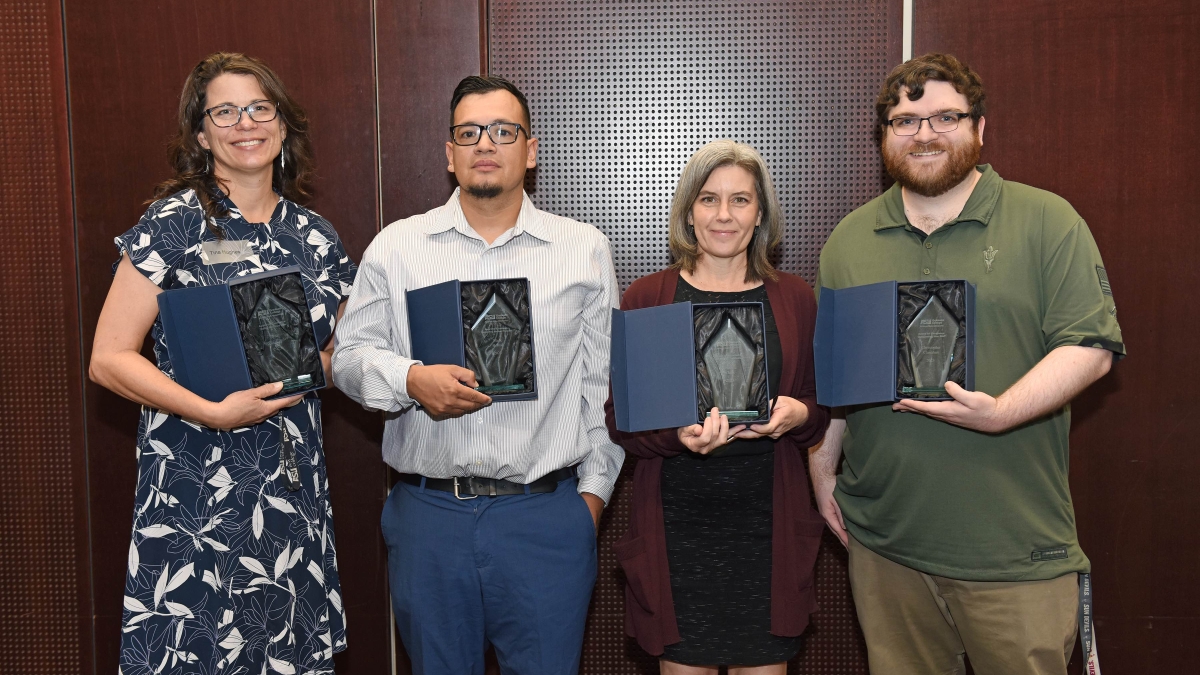ASU Graduate College announces 2023 Staff Awards for Excellence recipients

(From left) Tina Lopez-Hughes, Mark Bernal, Amanda Athey, who accepted the award on behlf of Michele Clark, and Christopher Clanahan pose with the 2023 Graduate College Staff Awards for Excellence.
Four staff members were honored with 2023 Graduate College Staff Awards for Excellence by the Graduate College at Arizona State University on Thursday, May 18.
This annual event celebrates the work and contributions of staff members who support graduate students, uphold the mission of the Graduate College and fulfill the ASU Charter.
Nominees were selected across different categories that highlight their dedication, adaptability and penchant for innovation. There were many powerful examples of the impact graduate support staff have on graduate students’ lives and careers.
The awards are distributed across four categories: Going the Extra Mile, Outstanding New Staff Member, Supporting Student Success and Outstanding Collaboration.
Outstanding New Staff Member: Christopher Clanahan
Clanahan, manager of graduate programs at the School of Geographical Sciences and Urban Planning, upholds a commitment to graduate success by carrying out annual reviews for doctoral students. Clanahan is crucial in assessing students' academic progress, as well as managing graduate advising, admissions, funding and awards, alumni relations, academic program logistics, curriculum, coordination, assessment and accreditation.
Clanahan actively seeks opportunities for change in the school’s graduate policies and regularly shapes the policy agenda, ensuring graduate students have current, relevant, equitable and transparent information.
"It is a great honor to receive the Graduate College Staff Award for Excellence: Outstanding New Staff Member. I would like to express my sincere gratitude to Dr. Daoqin Tong and the School of Geographical Sciences and Urban Planning for nominating me for this award. I would also like to thank my team for their ongoing support and dedication towards providing exceptional graduate experiences to our students. As an academic administrator, my goal is to engage, inform and advise students to become effective practitioners, innovative academics and empowered members of the community," Clanahan said.
Going the Extra Mile: Tina Lopez-Hughes
Lopez-Hughes is often called a “lifesaver" for graduate students as the academic success coordinator and manager of student services at the New College of Interdisciplinary Arts and Sciences on ASU's West campus.
She has been integral in promoting and implementing New College's accelerated master's degree programs. Lopez-Hughes meets with every student to craft a unique pathway to a graduate degree. She is hands-on during the faculty review process, explaining the nuance of each student's particular qualifications and career goals. Lopez-Hughes' efforts have helped increase the diversity and quality of the college's graudate student population.
"I am honored to receive this award, especially as my nomination came from two program directors I admire so much. I love education and serving others. Each opportunity to support our incredible faculty and students is my small contribution to their educational and professional goals. Whether it is connecting students and faculty, guiding international students through policies and procedures, or reminding students to apply to graduate, I hope my assistance makes their educational journey a smooth and positive experience," Lopez-Hughes said.
Outstanding Collaboration: Michele Clark
Known for establishing networks for underrepresented graduate students, Michele Clark has been instrumental in advocating for representation in science, technology, engineering and math. Clark is the program manager for Earth System Science for the Anthropocene Graduate Scholars Network, where she brings a robust scientific background working across disciplines and within governmental agencies.
Clark has helped seek funding for the National Science Foundation Graduate Research Fellowship Program and other entities. She was instrumental in the continuity of the CIRCLES Mentor Training Program in 2022 and has served on hiring committees for the Graduate College. She also spoke at student-facing events like the Preparing Future Faculty and Scholars Lunch and Learn seminar.
Clark is recognized as being thoughtful and generous with her time and expertise and has helped to transform graduate education into a more inclusive and holistic experience.
“She is a great connector within the university; she pulls engagement with staff, faculty and students to form essential networks of support,” said nominator Amanda Athey, the director of professional development and engagement at the Graduate College.
Supporting Student Success: Mark Bernal
Since Mark Bernal started working at the College of Health Solutions, faculty and staff have enjoyed positive changes in daily operations. For the past few months, the academic facilities specialist at the Downtown Phoenix campus has addressed maintenance issues small and large and prioritized health and safety concerns.
Bernal is known for excellent communication skills, diligence and dependability on the job and is highly attuned to the needs of faculty and staff. He strives to break barriers to accessibility and overall comfort, and his commitment to advancing graduate education is shown through a history of compassion toward the problems of others.
“Mark followed up with me the next day to verify whether my issues were resolved. I have not experienced such personalized follow-ups with service tickets in the past. This has been of tremendous help,” said nominator Thomas Kaufmann, a graduate teaching associate at the College of Health Solutions.
From taking off-hours calls to resolving escalating issues, faculty have noticed that he delivers in a timely manner, alleviating anxiety and ensuring his colleagues feel heard.

